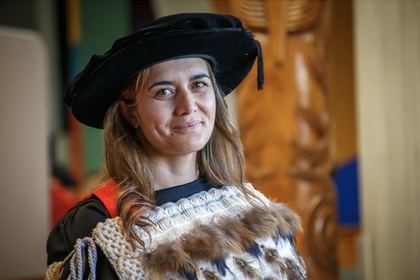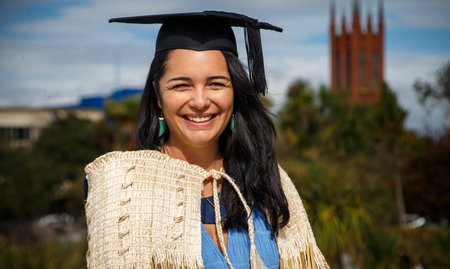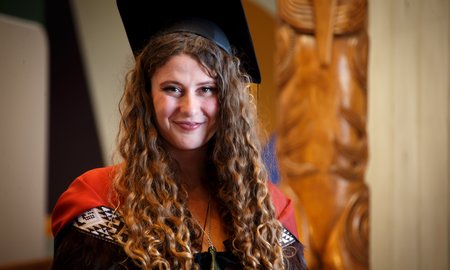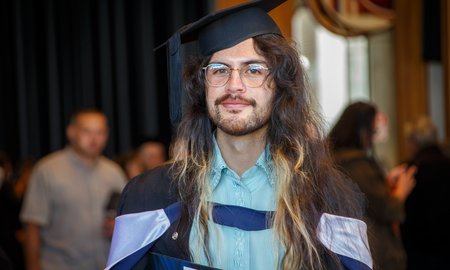
Dr Eleanor Brittain Wellington Graduation 2023
Māori narratives and storytelling are deeply embedded practices for Māori and these link with Māori wellbeing and wairua. Wairua is a vital aspect of te ao Māori, representing the essence, boundlessness, and connecting force.
Growing up, Dr Brittain found a deep appreciation for whānau and the importance of one's connection to the whenua (land). These values were not only a reflection of her identity but also a defining aspect of her upbringing, creating her established understanding of wairua.
“I spent my early years in Nūhaka and Te Whakakī, on my mother’s side this is where my whānau come from. My story is very much a part of my whānau story and I have felt grounded in my sense of belonging to the whenua my whānau call home.”
Based on her experience in psychology, Dr Brittain has noticed that numerous individuals tend to avoid discussing the topic of wairua, a behaviour she used to exhibit in the past.
“I experienced apprehension about my understanding of wairua and I anticipated that if I felt this way, others would feel similarly or even a greater hesitation. Wairua was a topic often shied away from within the psychological practice, and indeed broader mental health practice”, says Dr Brittain.
Purākau is traditional storytelling in te ao Māori, a practice Dr Brittain weaved into her research intentionally. Conducting one-on-one interviews with twelve Māori adults, who at some point experienced mental distress or accessed mental health services sustained as a form of purākau.
Dr Brittain says this approach is an intrinsically powerful experience, the sharing of and bearing witness to others' testament of suffering both as individuals and as a collection of narratives.
“The process of engaging in the research interviews, indeed in hearing and holding people’s stories was immensely humbling. I was and am so grateful for the generosity of the people who took part. At the heart of narrative research, and indeed storytelling, is the space in-between, where the story and relationships come to life. Prioritising narratives and meaning-making in this way was a primary focus of the research because as Māori, narratives are fundamental to our ways of being.”
Throughout the interviews, the respondents divulged accounts of distress and despair. Dr. Brittain noted that these experiences were an inevitable occurrence of wairua and concluded that ‘to suffer psychologically was to suffer spiritually’. Equally, a characteristic of healing and recovery was enriching wairua, which was inherently relational and enhanced through connections with whānau and collectives.
The inference of wairua found healing, centred on stages of rediscovery and reconnection for Māori wellbeing. The retelling of experiences as Māori was inherent to the narratives of wairua. Psychological distress and despair were, by their nature experiences for wairua, and enhancing wairua was a hallmark of healing and recovery. A concept Dr Brittain aspires to instil in wider psychological practices.
“Wairua is integral and integrative to Māori psychological experiences, and this poses pertinent questions about how we grant space for wairua in psychological practice. I would like to further contribute to understandings in this regard and consider ways this can flow through psychological practice, alongside contributing to Kaupapa Māori and Indigenous Psychologies.”
Interested in studying at Massey next year? Apply now.
Related news
Revitalising Māori education for future tamariki
The hope that her tamariki could experience a more equitable education system is what motivated Keita Durie, Ngāti Kauwhata, Rangitāne, Ngāi Te Rangi, to complete a Master of Education in Māori Education with Distinction.

Sharing the mana through connecting passions
Talia Brewer, Te Ātiawa ki Whakarongotai, Ngāti Raukawa ki te Tonga and Ngāti Toa Rangatira, Ngāti Ruanui, Ngā Ruahine, is graduating not only with a Master of Applied Social Work but with a reinforced sense of self and purpose.

Finding drive in a new perspective
With the pandemic delaying his plans to travel overseas, Matt Tini, Waikato, Ngāti Tiipa, Ngāti Rākaipaaka, Ngāti Kahungunu, decided to broaden his horizons by continuing his academic journey.
